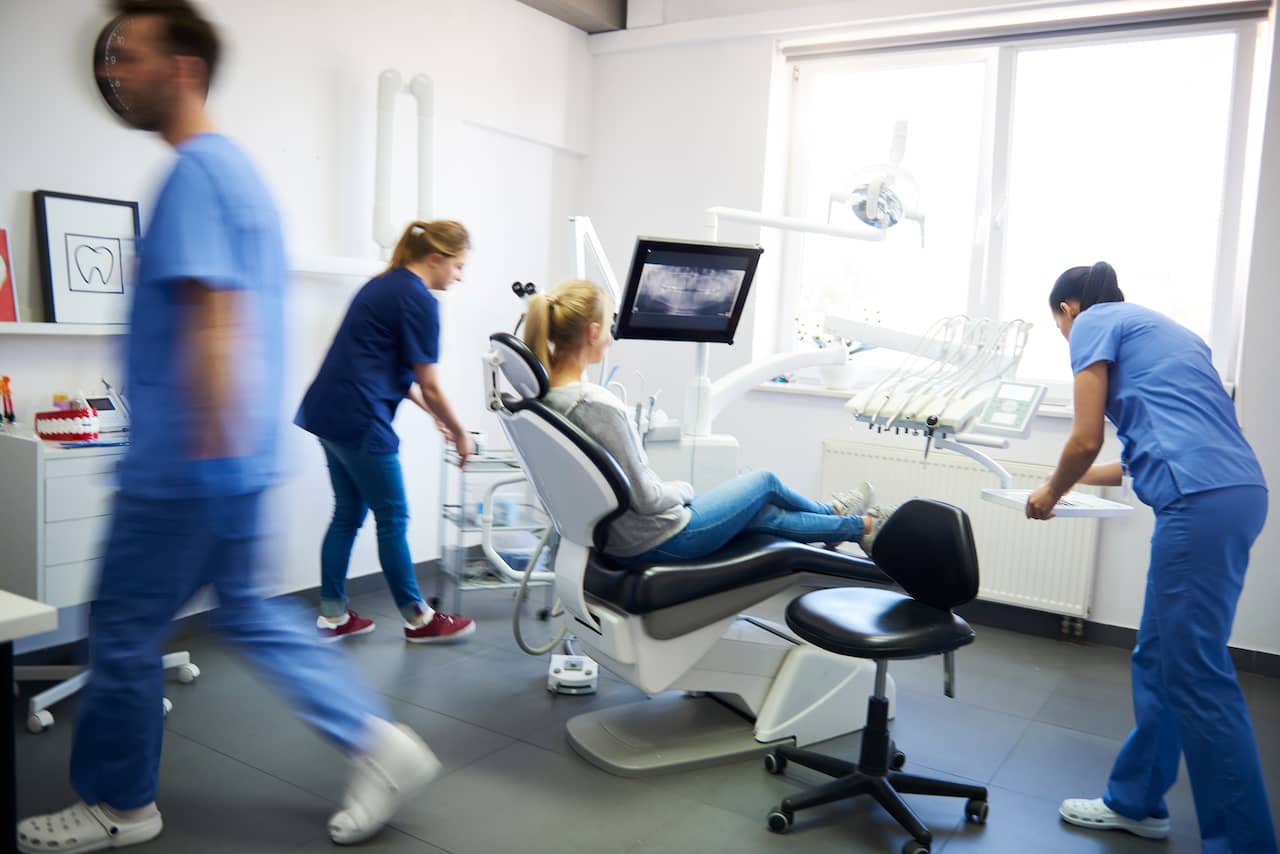
Implant-Supported Dentures Process and Procedure
Getting implant-supported dentures is a process, not a one-and-done denture procedure.
Although placing multiple implants at one visit is possible, integration and restoration of the implants with a final denture generally takes from 8 to 12 months, depending on the healing rate and case complexity. Therefore, multiple appointments over that timespan are required to complete the entire treatment process.
What to Expect Before Dental Implant Surgery
Examination
The surgeon will perform a detailed exam of your mouth and review your x-rays or CT scans. Your health history will also be thoroughly reviewed.
This is not the time to overlook or omit details about your health. Understand that there are certain medical conditions that are contraindicated for implant placement. Maintaining your overall health is more important than a denture with implants.
Preparatory Procedures
Even if you lack adequate bone in crucial areas, it may be possible to have bone augmentation or grafting performed for implants to work. Understand that this is a separate procedure and it adds additional costs and healing time in advance of the denture implant procedure itself.
Discuss Anesthetic
Most surgical denture implant procedures can be performed using only local anesthetic. Some patients are not comfortable knowing what is going on and want to be “knocked out” for their own peace of mind. Sedation must be arranged in advance of any surgery because it changes the protocol. If you think you might want to be sedated, discuss it early.
No Guarantees
Bone grafting and implant placement are dependent on your body’s ability to accept, heal, and recover from treatment. By choosing to have dental implants, you believe that you will benefit from the procedure.
Although dental implants enjoy roughly a 95% success rate, there are cases where the treatment does not work as expected and the patient has problems or implant failure for no apparent reason. Therefore, the outcome of any surgery is without guarantee and the patient assumes the risk.
How Best to Prepare for Your Denture Implant Procedure
Follow the Protocol
Your surgeon may prescribe a pre-operative regimen of antimicrobial mouth rinses, antibiotics, or other medications designed to make you more comfortable, minimize post-operative swelling and infection, and improve your chances of having a good surgical outcome.
Arrange your Schedule
Lighten your commitments and make time in your schedule for adequate rest to recover from surgery. Doing so will allow you the luxury of power-lounging should you not feel completely up to par.
Ask for Help
On the day of surgery, have someone drive you to and from the appointment. Also, arrange for help with daily activities that must continue such as child care or meal preparation for your family.
Plan your Diet
Before the dental procedure, prepare food that will be easy on the procedure site. For the first 48 to 72 hours after surgery, eat a diet of soft, nutritious foods. Baked fish, mashed potatoes, well-cooked vegetables, soups, and the like.
Follow-up Appointments
Your surgeon will want follow-up visits to assess your healing and remove sutures. Plan time for these appointments. They are important.
What Happens During Your Denture Implant Procedure
Assessment and Aftercare
Vital signs, including blood pressure, heart rate, oxygen levels, and glucose levels (for diabetics), will be taken before treatment begins. If your vitals are irregular, the dentist may elect to defer treatment. You will also receive written instructions detailing how to best care for the surgical area after the procedure.
Anesthesia
The surgeon will make sure that you are comfortable and don’t feel any pain by administering local anesthetic or sedation (if elected in advance).
Implant Placement
The gum tissue in the area will be reflected before creating a pilot hole for implant placement. The implants will be screwed into place. For endosteal implants, a cover screw will be used to protect the implant access while healing.
Close Tissue
The surgeon will use stitches to close the gums, covering the implants in the process.
Tips for a Quick Dental Implant Surgery Recovery
Expect to have bruising, minor pain, or soreness that originates from the surgical site or the site of the injections, swelling, and oozing.
Apply ice packs 10 minutes on, 10 minutes off to control swelling immediately after surgery. Take oral medicines as prescribed. Twenty-four hours after treatment, use warm salt water rinses 4 to 5 times daily to promote healing. Keep the surgical site clean.
The first two weeks after implant placement are the most critical time for healing and integration. Report problems, such as excessive swelling or numbness that doesn’t resolve, to the surgeon right away.
How to Know When You’re Ready for Dental Implants
Missing Teeth
Whether you are missing a few or all of your natural teeth, dental implants can help put back what you have lost, restoring your smile and your ability to chew.
Unrestorable Teeth
Teeth sometimes reach a point that nothing can be done to fix them. If you suffer from advanced gum disease or teeth that are severely worn or broken, dentures with implants may be your best solution.
Limited Diet
Tired of not being able to eat the things that you enjoy? Implant-supported dentures allow you to chew foods that were too difficult for traditional dentures or broken natural teeth.
Sunken Facial Appearance
Implants prevent naturally occurring bone loss and preserve the bone that supports the lower third of your face, making you appear more youthful.
Denture Adhesives
Do you feel like you are keeping the denture adhesive manufacturers in business? Lower denture implants can eliminate the need for messy adhesives and give you the freedom to enjoy eating, talking, and laughing without worry.
Picking the Best Dental Implant Clinic for You
Experience
The dental professional placing your implants should be experienced and have multiple surgeries under their belt, including the successful handling of issues that arise in the weeks and months that follow surgery. Ask questions about training and certifications.
Personal Referrals
Recommendations from trusted friends and neighbors who have undergone implant and denture processing are a great way to find the best surgeon for you. You are likely to feel reassured with your treatment if they had a good experience.
Comfort
Placing implants is an important part of the process. But equally important are the look and functionality of the dentures or other restorations. Most reliable denture clinics will have photos and testimonials of patients that have undergone the same treatment. Do their final restorations look natural to you? Do the staff and denturists truly care about you and your well-being? Do they stand behind their work?
Choose Experience
European Denture Center understands that implant-supported appliances can improve your life in ways that you never dreamed possible.
Our denturists have countless hours of practical experience gained by working with many different types of dental implant cases for over twenty years. We work exclusively with Idaho’s most technologically advanced dental lab. This partnership allows us to offer beautiful precise-fitting dentures and restorations that make you look your very best. When experience counts, count on European Denture Center!


